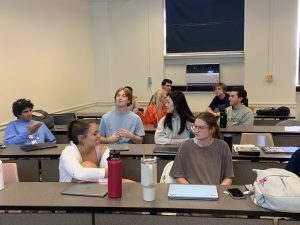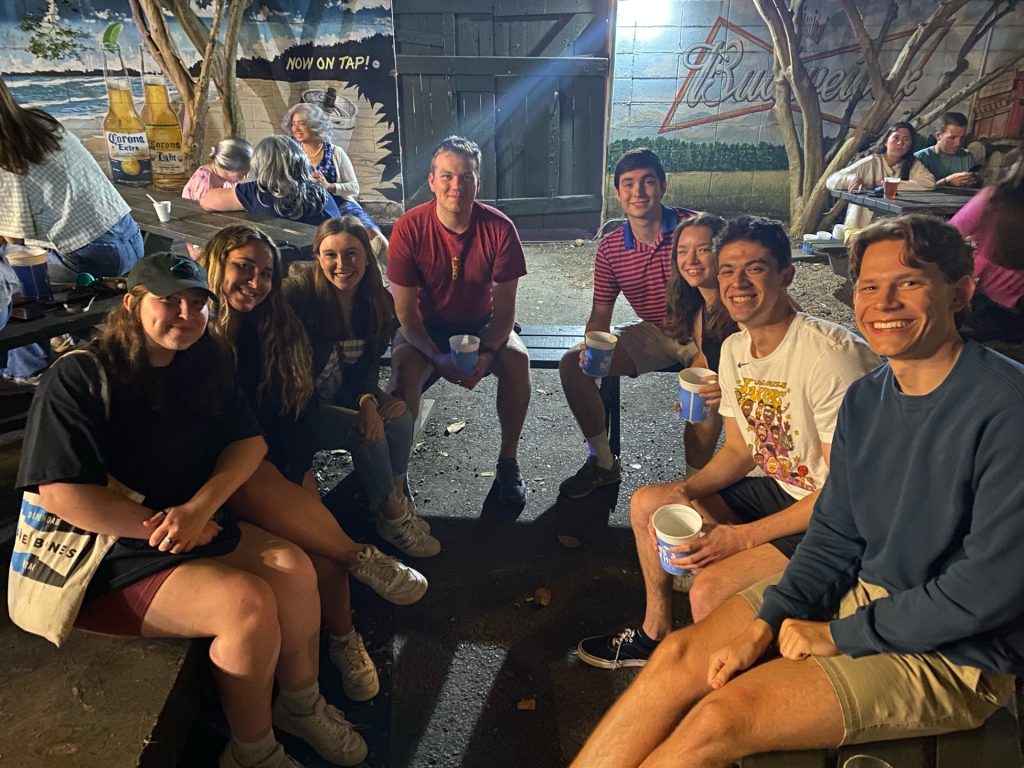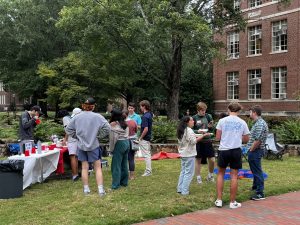Undergraduate Learning Assistant (ULA) Program
What is the ULA Program?
What do ULAs do?
What do ULAs get out of the program?
What are the requirements to be a ULA?
How do I apply?
What is the seminar for first-time ULAs like?
Testimonials from former ULAs
What is the ULA program?
The Undergraduate Learning Assistant (ULA) program in the Department of Economics at UNC has been providing undergraduate students with an opportunity to facilitate
education in economics since 2015. The ULA program is by invitation only; information about the application and selection is provided below. Students selected as ULAs are enrolled by the department in ECON 291. First-time ULAs, who participate in the weekly seminar described below, are enrolled for 3 credit hours while returning ULAs, who do not participate in the seminar, receive 1 credit hour.
What do ULAs do?
Responsibilities vary but typically include:
- Providing support during in-class activities
- Holding office hours
- Creating practice problems or other supplementary class materials
- Leading homework help sessions or content review sessions
- Monitoring online chat boards (such as CampusWire)
- Meeting one-on-one with students facing challenging situations
ULAs are also expected to have a strong understanding of the course concepts, meet with their supervising instructor at least once every two weeks, and maintain professional behavior. ULAs do not grade any assignments.
What do ULAs get out of the program? 
- Experience in facilitating undergraduate
education in economics - Leadership experience
- A deeper understanding of underlying economics principles
- Exposure to pedagogical theory and best practices
What are the requirements to be a ULA?
ULAs must fulfill the following departmental requirements, though exceptions can be made by individual
instructors on a case-by-case basis:
- Economics major with at least 9 in-major credit hours
- Sophomore standing or above
- At least a 3.5 overall GPA
- At least a 3.5 in-major GPA
- If possible, received credit for class for which they will be a ULA (preferably with that professor) and received at least a B+
- Instructor-specific requirements to be defined for each class
How do I apply?
- Applications open for the following semester on November 7/April 7. The link to the application will be sent via email to all Economics majors and can also be found here.
- Applications close on November 21/April 21. The list of applicants and their responses to the application questions will then be shared with all instructors teaching undergraduate courses in the following semester.
- Course instructors who choose to use ULAs begin their selection process after LDOC. The timeline and specific process vary from instructor to instructor, but most interview a subset of applicants during or soon after final exams and then select ULAs shortly thereafter. However, some instructors wait until close to the start of the next semester to interview. Therefore, for more information about the selection process or timeline, please contact the instructor of the course(s) for which you have applied to be a ULA.
What is the semester for first-time ULAs like?
First-time ULAS attend a weekly seminar for 10 weeks to receive pedagogical training designed specifically for the ULA program. In the seminar, students explore learning styles, pedagogical best practices, study skills and metacognition through weekly readings and videos, class discussions, and homework assignments. Specific topics include:
- Questioning for Learning

- Heterogenous Learners
- Prior Knowledge and Learning
- Motivation to Learn
- Organizing to Learn
- Learning Mastery
- Deliberate Practice
- Self-directed Learning
Seminar attendance is mandatory for all first-time ULAs.
Testimonials from Former ULAs
Anthony Hui (Class of ’24, ECON 460): I have enjoyed being a ULA for 2 years now for UNC ECON, and it has been a great opportunity to meet new students and help students excel and develop their passion for economics. As a ECON 460 ULA, supervised by Dr. Vaidyanathan, I have had the opportunity to solidify my own understanding of macroeconomics as well as in international trade and finance. Reflecting, this experience has defined my Carolina experience and it is so awesome to give back to the academic community of all sorts of majors, grade levels, and interests!
Annie Pi (Class of ’25, ECON 101): The role of a ULA is unique because it not only allows me to serve as an educator but also as a mentor, offering guidance and support that extends beyond the classroom. Perhaps most importantly, my time as a ULA has given me a sense of community. Being an integral part of the educational process, working closely with professors, namely Dr. Balaban and Dr. McDonough, and fostering a supportive environment for students has been incredibly fulfilling. It is a role that has not only deepened my knowledge and love for economics but also instilled a profound appreciation for the educational process as a whole. As I reflect on the past two years, I feel a deep sense of gratitude for the opportunity to contribute to the learning journeys of others, while simultaneously enhancing my own academic and personal growth.
Mary Troise (Class of ’23, ECON 410): The ULA program helped define my experience at Carolina and made the Economics department a welcoming and comfortable space. Working alongside Dr. Sheran-Andrews and my fellow ULAs, I gained a greater appreciation for the commitment of professors to their students and was able to connect with students along their academic path. I learned the importance of truly listening, patience, and the power of passion when committing to your work.
Russell Warren (Class of ’23, ECON 101 & 410): Being a ULA for the economics department was a truly meaningful experience during my time at UNC. By providing in-class support and holding weekly office hours, I was forced to review content from previous semesters, which I found useful in high level economics courses. From the Econ 291 Seminar, I learned new strategies for how to learn and study course material better, which set me up for success in later classes. I also enjoyed the relationships I built through this program. Over the years, I got to know my supervising instructor better and developed close friendships with fellow ULAs.

